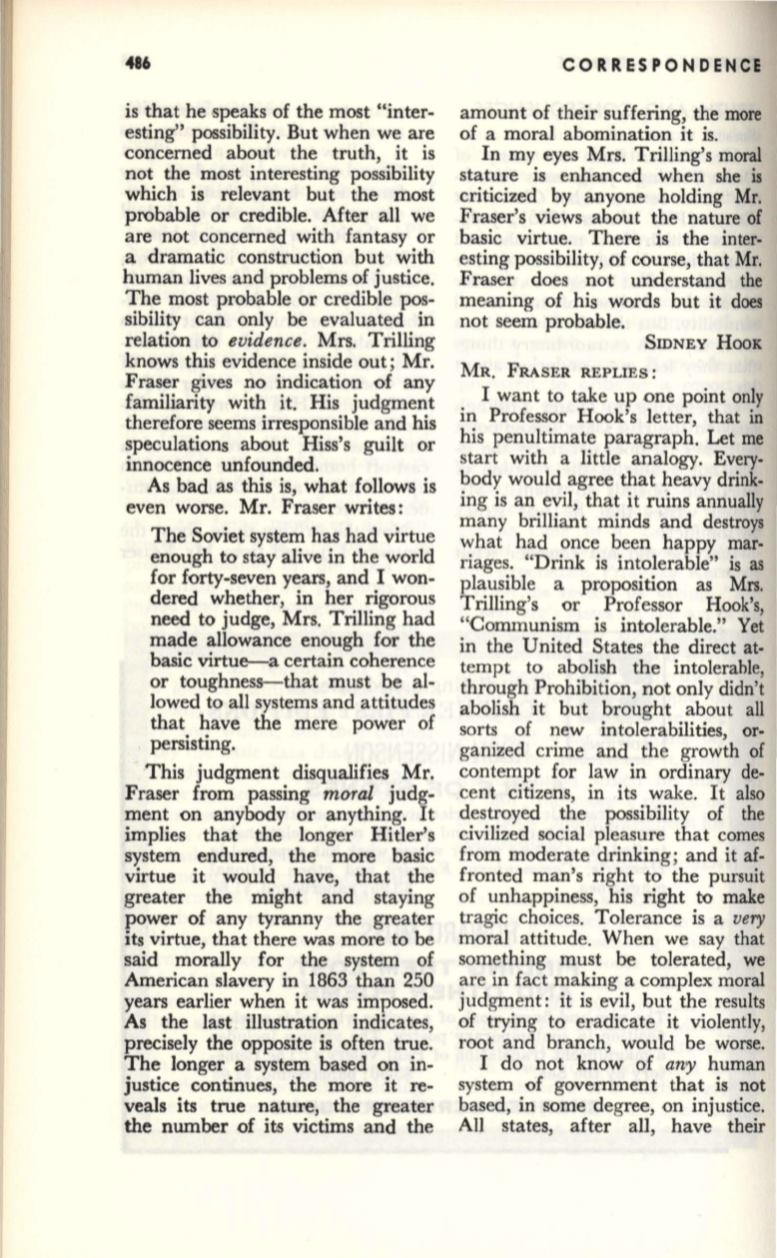
486
is that he speaks of the most "inter–
esting" possibility. But when we are
concerned about the truth, it is
not the most interesting possibility
which is relevant but the most
probable or credible. After all we
are not concerned with fantasy or
a dramatic construction but with
human lives and problems of justice.
The most probable or credible pos–
sibility can only be evaluated in
relation to
evidence.
Mrs. Trilling
knows this evidence inside out ; Mr.
Fraser gives no indication of any
familiarity with it. His judgment
therefore seems irresponsible and his
speculations about Hiss's guilt or
innocence unfounded.
As bad as this is, what follows is
even worse. Mr. Fraser writes:
The Soviet system has had virtue
enough to stay alive in the world
for forty-seven years, and I won–
dered whether, in her rigorous
need to judge, Mrs. Trilling had
made allowance enough for the
basic virtue-a certain coherence
or toughness-that must be al–
lowed to all systems and attitudes
that have the mere power of
persisting.
This judgment disqualifies Mr.
Fraser from passing
moral
judg–
ment on anybody or anything. It
implies that the longer Hitler's
system endured, the more basic
virtue it would have, that the
greater the might and staying
power of any tyranny the greater
its virtue, that there was more to be
said morally for the system of
American slavery in 1863 than 250
years earlier when it was imposed.
As the last illustration indicates,
precisely the opposite is often true.
The longer a system based on in–
justice continues, the more it re–
veals its true nature, the greater
the number of its victims and the
CORRESPONDENCE
amount of their suffering, the more
of a moral abomination it is.
In my eyes Mrs. Trilling's moral
stature is enhanced when she
is
criticized by anyone holding Mr.
Fraser's views about the nature of
basic virtue. There is the inter–
esting possibility, of course, that Mr.
Fraser does not understand the
meaning of his words but it does
not seem probable.
SIDNEY HOOK
MR. FRASER REPLIES:
I want to take up one point only
in Professor Hook's letter, that
in
his penultimate paragraph. Let me
start with a little analogy. Every–
body would agree that heavy drink–
ing is an evil, that it ruins annually
many brilliant minds and destroys
what had once been happy mar–
riages. "Drink is intolerable" is
as
plausible a proposition as Mrs.
Trilling's or Professor Hook's,
"Communism is intolerable." Yet
in the United States the direct at–
tempt to abolish the intolerable,
through Prohibition, not only didn't
abolish it but brought about all
sorts of new intolerabilities, or–
ganized crime and the growth of
contempt for law in ordinary de–
cent citizens, in its wake. It also
destroyed the possibility of the
civilized social pleasure that comes
from moderate drinking ; and it
af–
fronted man's right to the pursuit
of unhappiness, his right to make
tragic choices. Tolerance is a
very
moral attitude. When we say that
something must be tolerated, we
are in fact making a complex moral
judgment : it is evil, but the results
of trying to eradicate it violently,
root and branch, would be worse.
I do not know of
any
human
system of government that is not
based, in some degree, on injustice.
All states, after all, have their


